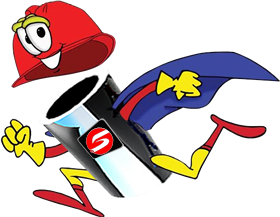Basalt Lining Tiles
Durable basalt lining tiles designed for wear resistance in industrial applications.
Cast Basalt Wear Resistant Material thanks to its special characteristics, is superbly suitable as wear protection.
Refining basalt to a finely crystallised glass ceramic, SunnySteel’s cast basalt wear resistant material provides an extremely durable, long-lasting lining for static plants bearing large volumes of abrasive and/or corrosive matter.
Supplied as both a pipe and tile lining solution, cast basalt is ideally suited for wet material handling applications with lower impacts, such as coal chutes, ash sluiceways, ash pipelines at power stations and hydraulic granulated slag or sand conveying. Basalt delivers high resistance to wear corrosion and temperatures up to approximately 400 °C.
Basalt tiles can be placed and jointed in cement or specially-defined bonding agents, as demanded by the intended application. Basalt tiles can be provided with a central hole that is countersunk for individual bolting, or as ready-made liner plates and pipes.
Features
Cast Basalt is supplied in pipe and tile form and provides an extremely hard wearing surface for abrasive or corrosive materials.
What is Cast Basalt?
Naturally occurring Basalt rock is quarried, melted, cast and annealed to form a finely crystallised glass, ceramic of extreme hardness (8.5 on the Moh scale).
What is it For?
Basalt provides a long-lasting lining for static plants, over which large volumes or abrasive and/or corrosive materials are passed.
How is it Fixed?
Basalt tiles can be bedded and jointed in cement or special bonding agents. The agents chosen depend on the application. Tiles can be supplied with a countersunk central hole for individual bolting onto or in ready-made liner plates and pipes.
Where is it Used?
Cast Basalt is best suited for wet material handling applications, such as coal chutes, ash sluiceways, ash pipelines at power stations, and hydraulic granulated slag or sand conveying systems. Basalt can resist wear, corrosion and temperatures up to approximately 400 degrees, and should be used in light impact areas. If you are in doubt, let our sales engineer advise you on an impact friendly design.

When you partner with Sunny Steel, you can stop worrying about meeting deadlines thanks to our responsive and timely service. You'll also say goodbye to unnecessary shopping around. Instead, you'll get white glove service from an expert who understands your needs and can get you the materials you need quickly.
